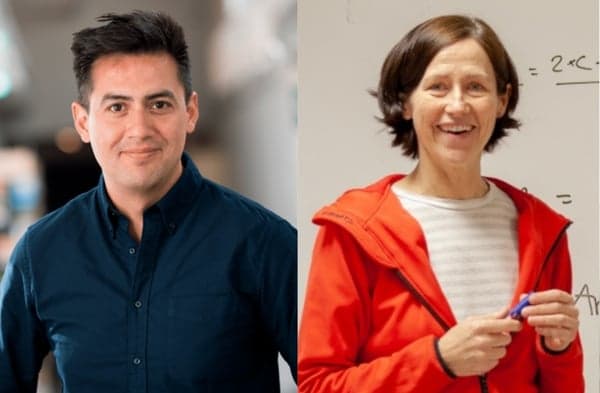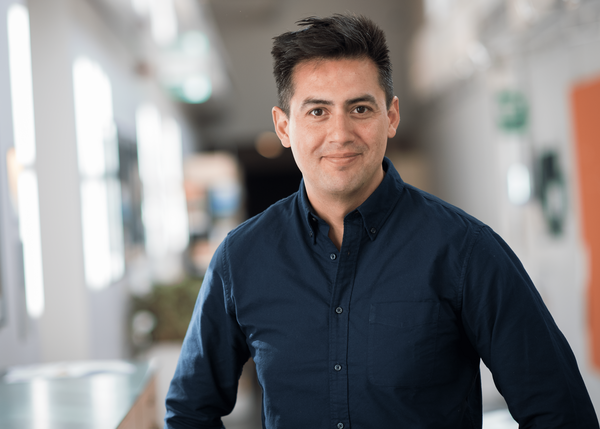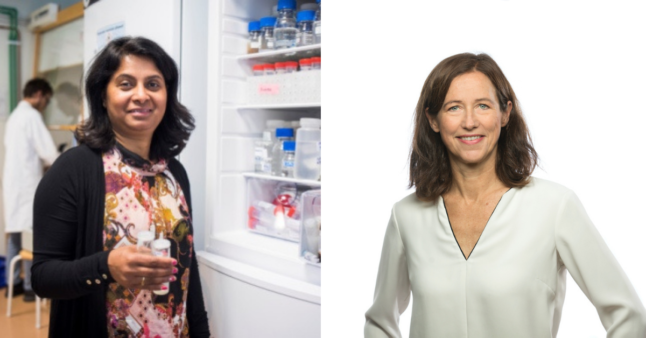From AI to green chemistry: how Stockholm University is tackling the climate change crisis
Climate change is rising back to the top of the global agenda. From the US rejoining the Paris Agreement to extreme winter weather in much of Europe and North America, the topic demands our attention.

Researchers at Stockholm University are working on a wide range of challenges related to the climate crisis and creating a more sustainable future. The Local spoke to three of its experts about their work – and their hopes and concerns for the future.
Find out more about Stockholm University and its values
Will AI’s ‘dark machines’ offer climate solutions?
“The use of AI for sustainability and tackling climate change is fascinating,” says Victor Galaz, of the Stockholm Resilience Centre. “In terms of both the opportunities but also the risks.”
While AI and the climate crisis are two of the biggest topics of our time, Galaz says the relationship between them must be better understood. AI is often seen as applicable to our biggest environmental challenge only through energy systems and engineering.
This viewpoint dramatically understates AI’s importance, says Chilean-born Galaz. “AI technologies go into every aspect of our society: farming systems, financial systems, forestry, and stewardship of the oceans,” he says. “They also shape how we perceive what’s happening on the planet, whether through climate change modelling or the news we get via social media algorithms. It’s very broad but it also goes deep by tinkering with our emotional world.”
This understanding inspired Galaz to co-found AI, People & Planet to open up greater discussion of these issues. He cites the EU Green Deal as one example of an ambition “to combine the digital agenda and the climate agenda” but believes there should be many more.
In all, he identifies four principal dimensions in which AI could help with the climate crisis:
- fine-tuning of monitoring and modelling
- optimising emissions reductions and mitigation
- improved adaptation
- potential innovations humans would not have created.
Adaptation projects include using the power of data to give farmers better weather predictions. Such projects can involve complex maths and infrastructure – yet give farmers on the ground exactly what they need to know on their smartphones for free, says Galaz.
The final dimension – the idea of AI offering radically new innovations – is tantalising but as yet unproven. Given the advances with Deep Learning, however, it may not be far-fetched.
 Victor Galaz. Photo credit: Azote Images
Victor Galaz. Photo credit: Azote Images
“That’s what AI is good at: you give it a clear target, say here’s the data, here are the requirements and if you’re lucky it gives you a solution you never would have thought about,” he says. “It could be a totally new material, a design or even a business model.”
The emotional power of AI could also lead to technologies that help people connect to nature and feel empathy with people far away – or even with animal species, he says.
The positive potential seems huge. So why is Galaz writing a book on the topic called Dark Machines?
“I chose the name because these systems, whether in themselves or in combination, become somewhat opaque,” he says. Galaz worries about “limited transparency and therefore limited accountability at times”.
“I’m concerned,” he continues. “Any technology lands in a particular social, political or ecological context. Once a solution ‘goes into the wild’, it can have unexpected impacts.”
Examples have included “discriminatory effects against people of colour and weaker social groups” in policing or with algorithms used in the health sector. Galaz warns that similar impacts could be seen in digital farming, for example, if automation favours monopolies and squeezes out small-scale farmers.
“We should think about this early and I don’t think it’s being done properly today,” he says. “There are strong commercial and political pressures to move this out as quickly as possible. AI is changing the planet so we need to ask ‘how can we track it in a more fruitful way?’”
Search the courses and programmes at Stockholm University
Green chemistry: a Stockholm success
The search for more environmentally-friendly materials will not yet be left purely to AI. It’s also an area of focus for countless chemists globally, including at Stockholm University.
But what exactly is ‘green chemistry’ and why do you need to know about it? “Green chemistry was a term adopted some years ago and it has since been replaced by sustainable chemistry,” says Professor Berit Olofsson. “Chemistry is very important for many areas in society and much research has focused on reducing costs for industry, with a lot of that depending on oil. Sustainable chemistry is about how we can use other resources to make materials and the active components in pharmaceutical drugs.”
Professor Olofsson is chair of the board of the newly established Stockholm University Centre for Circular and Sustainable Systems (SUCCESS). It will be mainly a research centre but also with some teaching element, she says.
The centre builds on the university’s strength in this area. In 2019-2020, the man known as the ‘Father of Green Chemistry’ held the King Carl XVI Gustaf Professorship in Environmental Science at Stockholm University.
Professor Paul T. Anastas, of Yale University was hosted by Anja-Verena Mudring, professor of physical materials chemistry. “Paul gave us the tools so we, as chemists, can act as the ‘good guys’’, she said.
One researcher putting the tools to good effect at Stockholm University is Professor Aji Mathew. Using mainly forest waste as raw material and a 3D printer, she and her team at the Department of Materials and Environment Chemistry have built various bio-based nanomaterials. One can be used to purify wastewater from mining.
 Aji Mathew and Berit Olofsson of Stockholm University
Aji Mathew and Berit Olofsson of Stockholm UniversityGlobally, Professor Olofsson says there has already been significant progress in materials chemistry and battery research – but much less in pharmaceutical. Consumers concerned about plastics can take heart from a strong focus on “producing biodegradable plastics and ensuring oil-based plastics are recoverable”.
Still, the challenges ahead remain great. “Climate change is happening so fast now that we need more practical solutions that come through fast,” says Professor Olofsson.
Economics and the environment
Seeking to build systems that are both sustainable and dynamic, what must policymakers understand about economics and the environment?
“Coronavirus lays bare all the inequalities and all the things we were doing wrong in a merciless and cruel way,” says Anna Tompsett. “It’s very clear that markets don’t help you achieve environmental goals or address inequality in society. That’s basic economic theory.”
Tompsett is the British course director for Economics of Development and the Environment, a second year Master’s course at Stockholm University. The course explores how the environment has shaped human societies, how human systems have shaped the environment, and how we can improve our understanding of this two-way relationship.
One lecture focuses on infectious diseases. “Epidemiologists were saying that if you stay up at night worrying about something, it should be about a pandemic,” says Tompsett. “Then, it came and suddenly there’s a lot of interest in combining epidemiology and economics, which we’ve been doing all along.”
So what hope for a happier co-existence between economics and the environment from now on? Tompsett says the global focus on continuing the Paris Agreement after the US left and the strong economic case for more wind and solar power are real positives.
“We’ve also seen through the pandemic that we can make radical changes that seemed unthinkable before, so maybe that spirit will carry over into the future,” she adds.
This content was paid for by an advertiser and produced by The Local's Creative Studio.

Join the conversation in our comments section below. Share your own views and experience and if you have a question or suggestion for our journalists then email us at [email protected].
Please keep comments civil, constructive and on topic – and make sure to read our terms of use before getting involved.
Please log in here to leave a comment.